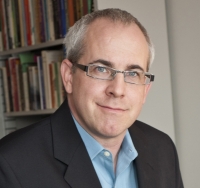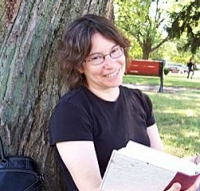New courses in the Boston College undergraduate core curriculum provide students opportunities to examine climate change from both moral and scientific perspectives, discuss how innovative thinking in the business and arts communities might solve complex problems, and explore the biological basis of epidemics and disease and their socioeconomic ramifications.
These interdisciplinary courses – intended for freshmen – are among a cohort debuting this academic year as part of the pilot program that is the leading edge of BC’s broad-based core renewal initiative.

“Students of this generation learn in different ways than those of 10 to 15 years ago. What we’ve found is that they can handle a lot, they can think complexly, they’re quick to put things together, and – perhaps most importantly – they’re really looking for community and a sense of groundedness. And these are elements we feel are key to the core renewal." —University Core Renewal Committee Chair Julian Bourg
The core pilot program, which began last year, has spurred a host of imaginative faculty collaborations, some representing seemingly unlikely combinations of disciplines, among them theater and political science, chemistry and English, theology and earth and environmental sciences, and nursing and English.
Leaders of the four-year-old core renewal effort note that participating faculty and students alike have expressed overwhelmingly positive views about the pilot program and its impact – a promising sign for the next round of new courses next academic year, as well as the next phase of core renewal implementation.
“Students of this generation learn in different ways than those of 10 to 15 years ago,” said Julian Bourg, associate dean for the core in the Morrissey College of Arts and Sciences and chair of the University Core Renewal Committee (UCRC). “What we’ve found is that they can handle a lot, they can think complexly, they’re quick to put things together, and – perhaps most importantly – they’re really looking for community and a sense of groundedness. And these are elements we feel are key to the core renewal.
“We’re still in the experimental phase, and hopefully by next September we will have a plan for a sustainable, post-pilot core. The idea behind the pilot program is to start small, build on strengths and remove the rough spots.”
“The question for the pilot program is, ‘How big can this get?’” said Institute for the Liberal Arts Director Mary Crane, another UCRC member. “The number of seats for pilot core courses doubled over last year, and course enrollment nearly did the same. More than 40 faculty members from three schools will be involved in the program over two years. Based on what we’ve seen, there is every reason to believe the program can continue to grow in year three.”
Eight pilot courses debuted last fall: two in the “Complex Problems” model, team-taught, six-credit classes of around 80 students that address a contemporary problem; and six pairs of linked classes in the “Enduring Questions” category, distinct three-credit classes taken by the same 19 students that are each taught by a faculty member from a different department but connected by common topics, sets of questions, readings and assignments.
This academic year brings the introduction of five Complex Problems courses and 11 pairs of Enduring Questions courses. These include Can Creativity Save the World?; A Perfect Moral Storm: The Science and Ethics of Climate Change; and the paired classes Narrating Black Intimacies and Black Intimacy and Intersectionality in the U.S. (Read an interview with the faculty creators of these courses here.)
Both types of courses include “Reflection” sessions, designed to help students integrate “what they learn with who they are,” according to Bourg and Crane, and how it is relevant to their lives outside the classroom – a practice that is the cornerstone of Jesuit education.
Reflection sessions can take many forms, note Bourg and Crane, including discussions, talks with invited speakers and field trips: One class, the Body in Sickness and Health, brought students to the Connell School of Nursing for a demonstration of a birth simulator; a music class went to Conte Forum to observe the interplay between the atmosphere and action of a BC hockey game with the BC Pep Band’s performance.

“We’ve observed more faculty showing interest in the possibility of interdisciplinary collaborations – even if not all conversations necessarily result in a core course proposal. This in and of itself is a positive development, and indicates how a renewed core curriculum can inspire faculty as well as students.”—Institute for the Liberal Arts Director and Core Renewal Committee Member Mary Crane
Bourg and Crane point to surveys and course evaluations indicating a high level of satisfaction among faculty and students with the pilot courses program. Students have said the courses challenge them to think in new ways – a challenge they appear to enjoy – and believe the content is interesting and will be useful in the future; they also often develop a bond with classmates that extends beyond the class itself.
While teaching core courses entails “many moving parts” and high levels of energy and coordination, said Bourg and Crane, faculty have expressed appreciation for the opportunity to have multifaceted dialogues with their students instead of taking a more formulaic approach. Faculty also reported students by and large have been able to navigate the challenges of interdisciplinary learning.
“Faculty in the pilot program have engaged with the mission of BC in inventive, imaginative ways,” said Bourg. “The Reflection sessions in particular attest to that. They’re the connective tissue between what a student experiences in the classroom and how he or she internalizes it.”
Crane noted that the UCRC and ILA encourage and support faculty participation in the core pilot program on many fronts: hosting receptions or using other means to help faculty members seek potential collaborators; providing funds to faculty for participating in planning and pedagogical workshops, or to assist the development of co-curricular planning. In addition, a classroom in Carney Hall has been converted to multiple-use space – to accommodate theater exercises as well as projects, innovation and other lab activities – for Complex Problems classes.
“We’ve observed more faculty showing interest in the possibility of interdisciplinary collaborations – even if not all conversations necessarily result in a core course proposal,” she said. “This in and of itself is a positive development, and indicates how a renewed core curriculum can inspire faculty as well as students.”
The UCRC has invited faculty to submit proposals for pilot classes to core@bc.edu in consideration for the 2017-18 academic year. The deadline for submissions is Oct. 14.
For more information, visit the core renewal website.
—Sean Smith | News & Public Affairs



